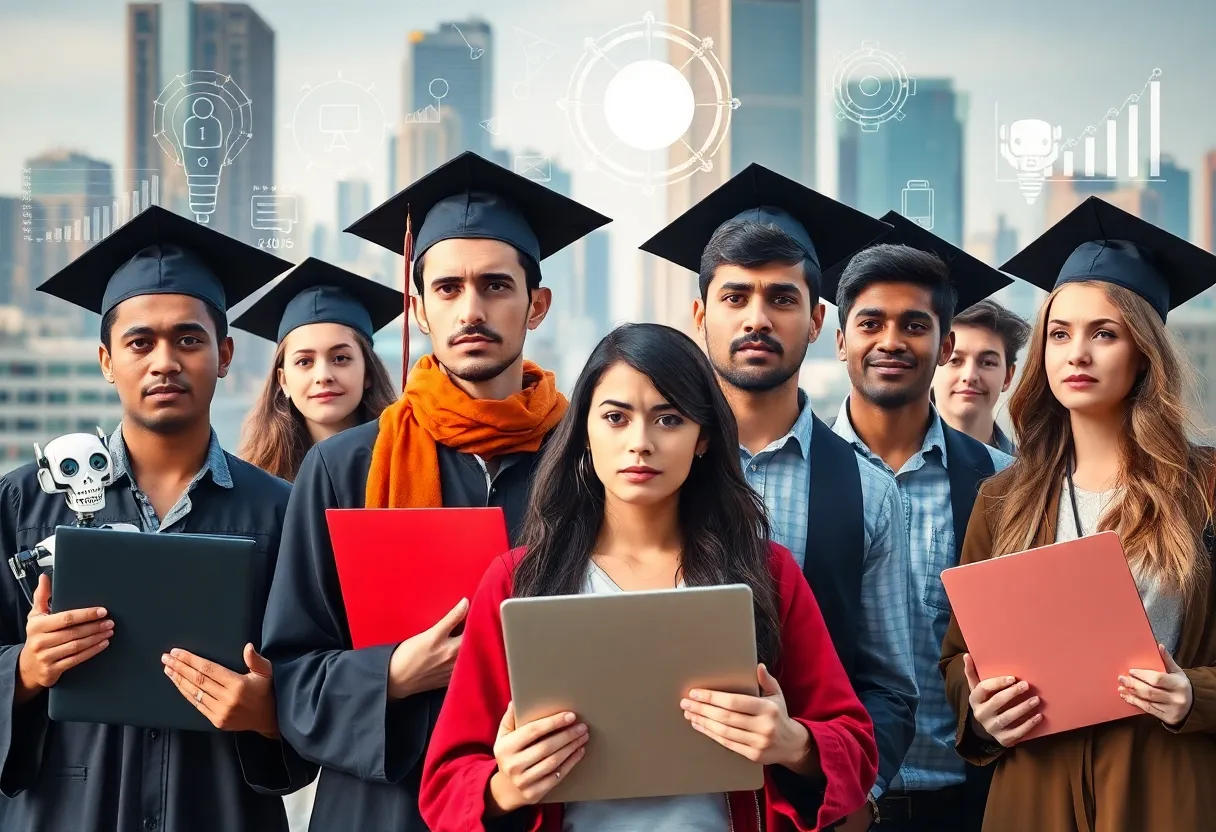News Summary
The U.S. job market is facing significant hurdles, especially for recent college graduates. Rising unemployment rates, accelerated by the pandemic and advancements in generative AI technologies, are reshaping workforce skills. With employers emphasizing new requirements for ‘AI fluency’ and ‘prompt engineering’, educational institutions are adapting their curricula. New AI-focused programs and partnerships aim to equip students with necessary skills, yet concerns remain about job displacement and the growing economic gap influenced by AI adoption.
Atlanta, Georgia – As of June 2025, the U.S. job market is facing significant challenges, especially for recent college graduates, exacerbated by post-pandemic unemployment rates and the rapid advancement of generative AI technologies. The unemployment rate for 20-24-year-old college graduates with bachelor’s degrees has surged to 6.2 percent, marking the highest figure outside of the pandemic since December 2014. Meanwhile, for 16-to-19-year-old high school graduates with no college education, the six-month moving average unemployment rate has risen to 14.2 percent, up from 11.6 percent in December 2022.
The introduction of generative AI is a major driver reshaping the employment landscape, as companies swiftly adopt tools for code writing, text generation, and data analysis. This transition is leading to a fundamental change in the skills required within the workforce, with more job postings emphasizing needs for “AI fluency” and “prompt engineering”. The implications of this shift are significant, with some traditional roles disappearing while others adapt or evolve. A recent report from the World Economic Forum predicts not only challenges but also new job opportunities emerging through 2030.
Research indicates that companies leveraging generative AI are seeing productivity gains alongside job growth. These advanced AI systems differentiate themselves from previous technological innovations by interpreting data, simulating scenarios, and generating insights akin to human cognitive processes. In response to these trends, educational institutions like Robinson College of Business at Georgia State University are adapting their curricula to include interdisciplinary master’s degrees that integrate machine learning and generative AI with expertise in fields such as accounting and actuarial science.
Robinson College is launching two new AI-focused graduate certificates this fall, aiming to prepare future leaders for environments increasingly enhanced by AI technologies. In tandem, partnerships with employers, such as the Delta Analytics Academy, are creating pathways for upskilling employees without college degrees, focusing on entry into analyst roles. Clark Atlanta University is also collaborating with IBM SkillsBuild to empower students with essential AI skills, thereby addressing the digital divide and enhancing career prospects for young adults.
Amid these transitions, data from a McKinsey study reveals a concerning trend: generative AI may widen the economic gap in the U.S. by an estimated $43 billion annually, disproportionately impacting Black workers. The partnership between IBM and Clark Atlanta University includes faculty training and access to generative AI products, providing students with practical learning experiences that include hackathons and capstone projects throughout their academic year.
Despite the advancements, the changing job landscape is met with challenges, with 39 percent of current skills projected to become obsolete by 2030. This is compounded by the fact that 76 percent of developers do not consider themselves proficient in generative AI. The acceleration of AI adoption is happening at an unprecedented pace, outstripping earlier technological revolutions like the internet. Currently, about 17 percent of U.S. workers report incorporating AI into their job tasks to some degree.
Business leaders face intense pressure to implement AI effectively, as failures in this area can result in competitive disadvantages. Across various sectors, AI tools are making inroads, especially in healthcare, where technologies are being used to enhance patient interaction by improving documentation processes. In legal sectors, generative AI is transforming operations by expediting prototype development and enhancing research capabilities.
Looking ahead, the immediate future of AI adoption will largely depend on how well companies navigate the transition to these new technologies and invest in upskilling their workforce for the responsibilities these advancements bring. As organizations adapt, the focus on educational reform and workforce development will be critical in supporting a labor force that’s equipped to meet the challenges posed by the evolving job market.
Deeper Dive: News & Info About This Topic
- People of Color in Tech
- Wikipedia: Generative AI
- Black PR Wire
- Google Search: AI jobs market
- Axios
- Encyclopedia Britannica: Artificial Intelligence
- AJC
- Google News: Atlanta AI employment

Author: STAFF HERE AUGUSTA WRITER
The AUGUSTA STAFF WRITER represents the experienced team at HEREAugusta.com, your go-to source for actionable local news and information in Augusta, Richmond County, and beyond. Specializing in "news you can use," we cover essential topics like product reviews for personal and business needs, local business directories, politics, real estate trends, neighborhood insights, and state news affecting the area—with deep expertise drawn from years of dedicated reporting and strong community input, including local press releases and business updates. We deliver top reporting on high-value events such as Arts in the Heart Festival, Westobou Festival, and Masters Week. Our coverage extends to key organizations like the Augusta Metro Chamber of Commerce and Greater Augusta Arts Council, plus leading businesses in manufacturing and healthcare that power the local economy such as Textron Specialized Vehicles, Cardinal Health, and Nutrien. As part of the broader HERE network, including HEREAtlanta.com and HERESavannah.com, we provide comprehensive, credible insights into Georgia's dynamic landscape.


